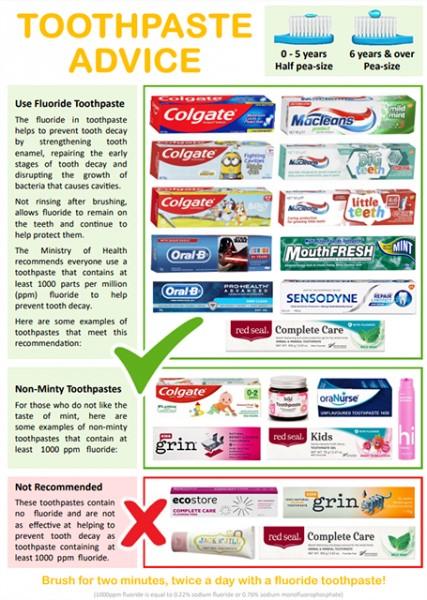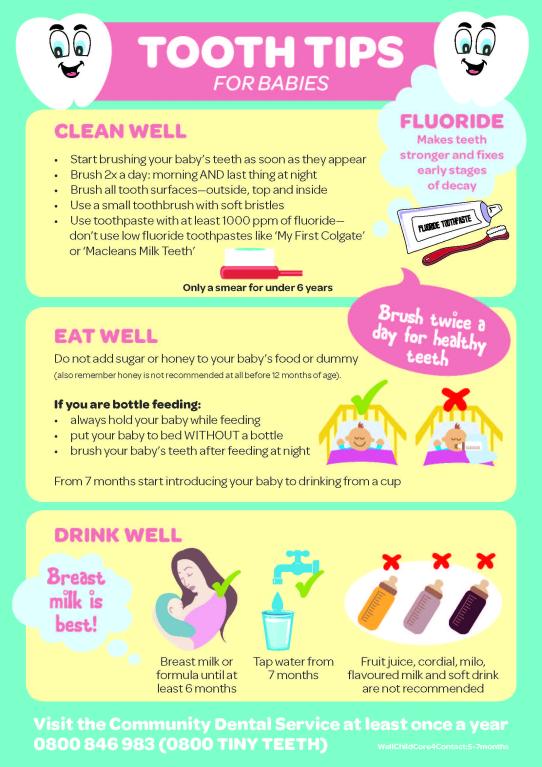New Zealand Dental Association video: Brushing teeth with pēpē
What you need to know about your baby's teeth
Teeth start forming in the womb and most babies are born with a full set of 20 baby teeth, usually hidden under their gums.
Babies' teeth usually start to appear between 6 to 10 months, but some are born with teeth showing above the gums and some take longer.
It's important you take care of your baby's teeth as healthy baby teeth are needed for chewing and proper speech development.
Teeth and teething
Many babies' teeth come through without any problems, but for some the gums swell and become sore as teeth break through.
What is teething?
Teething is when your baby's teeth come through the gums. While most babies are born with a full set of 20 teeth, they don't usually appear through the gums until between 6 to 10 months.
The lower (bottom) front teeth usually come through the gum first. These are followed by the upper (top) front teeth. The picture below shows when each tooth usually appears.
The bottom front teeth come through at 6 to 10 months, and the top front teeth at 8 to 12 months. Then, the top teeth on either side at 9 to 13 months, and the bottom teeth on either side at 10 to 16 months. The first top molar teeth come in at 13 to 19 months. The first bottom molars come in at 14 to 18 months. Then the top canines at 16 to 22 months and the bottom canines at 17 to 23 months. The last bottom molars come through at 23 to 31 months, and the last top molars at 25 to 33 months.
Many babies' teeth come through without any problems, but for some the gums swell and become tender as teeth break through.
Your teething baby may:
- cry
- have a slight fever
- have red cheeks
- drool
- not eat or sleep well
- want to bite something hard
How to help your teething baby
The following may help your baby if they are upset:
- give your baby something to chew on, such as a clean teething ring
- rub some teething gel on their gums, especially before feeding
If your baby has a lot of pain, bleeding or pus in their gums or swelling in the mouth or face, call Healthline on 0800 611 116 or see a dentist or another health professional.
Teething doesn't make babies sick. If your baby is unwell, call Healthline on 0800 611 116 or see a health professional.
Find out how to care for your preschooler's teeth.
Caring For Your Child's Teeth: 1 To 5 Years
How to care for your baby's teeth in 5 steps
Healthy teeth = a healthy smile.
Follow these 5 steps to protect your baby's smile:
- Brush teeth twice a day.
- Use fluoride toothpaste.
- Have regular dental check-ups.
- Lift the lip every month to check for signs of tooth decay (holes).
- Choose healthy foods and drinks.
Brush teeth twice a day
Your baby will start getting their first teeth at around 6 months. These first teeth will help your baby to eat and speak well. Healthy baby teeth usually mean healthy adult teeth too, so it's important that you look after your baby's first teeth.
You can start cleaning your baby's teeth before they show by gently wiping their gums with a clean, damp facecloth or gauze wrapped around your finger. This helps your baby get used to you touching their teeth and gums.
As soon as your baby's teeth start to show, start brushing. Use a small, soft brush and a half-pea size amount of regular-strength fluoride toothpaste twice a day. One brushing should be at night before your baby goes to bed.
Some tips for brushing your baby's teeth:
- hold your baby in a position where you can see their mouth and where they feel secure
- cup their chin in your hands and rest their head against your body
- clean their teeth using gentle circular motions
- lift their lips to brush the front and back of the teeth and at the gum line
- when finished, rinse the toothbrush and store it in an upright position so it can air-dry - make sure it's not touching other toothbrushes as that can cause germs to move from one brush to another
See the toothpaste advice chart from the Bee Healthy Regional Dental Service on which toothpaste to use, which ones to avoid, and how much to use.

Watch a video about how parents make sure they brush their children's teeth twice a day.
Source: Dental Health Services Victoria, Australia
Use fluoride toothpaste
Fluoride makes teeth stronger and reduces tooth decay (holes). Use a 1000 parts per million (ppm) regular-strength fluoride toothpaste for your baby's teeth.
Fluoridation For Preventing & Reducing Tooth Decay
Regular dental check-ups
Oral healthcare is free for all children until they turn 18. Enrol your baby with the service as early as possible, so that you can arrange the first check-up. Regular check-ups increase the chances of finding and treating any tooth decay early. To enrol your baby with a service or to make an appointment, phone 0800 TALK TEETH (0800 825 583).
Lift the lip every month
Gently lift your baby's top lip once a month to check inside their mouth. It’s a quick and easy way to see if tooth decay is present.
You can read about tooth decay and what to look for on the Plunket website.
If you are worried about your baby's teeth, talk with your Well Child Tamariki Ora nurse at the next visit, or with your doctor, or contact your Community Oral Health Service.
Choose healthy foods and drinks
It’s best to exclusively breastfeed your baby for the first 6 months of their life and continue to breastfeed until they are at least 1 year of age.
Your baby may be ready to start eating solid food at around 6 months of age. To protect your baby's teeth, choose healthy foods and drinks. Sweet drinks, foods and fruit juices can cause tooth decay and cause your baby to develop a taste for sweet foods.
Don't put your baby to bed with a bottle. Going to sleep with a bottle of milk, a warm chocolate drink or juice will start to cause tooth decay. If they want to suck on something to settle themselves, it's better to use a dummy (pacifier).
Watch this video to find out why your child's first teeth are important and how to care for them.
Source: Ministry of Health
transcribeTranscript
Title: Your Child: Healthy Teeth. Episode 14 of 15.
Title: Renee & Dez’s Whānau
[Shots of Renee and Dez’s home.]
Debbie (voice-over): It's really important for your child's first teeth to be looked after, for their own growth and development. They need them for eating, speaking and generally keeping well.
[Interview with Debbie.]
Title: Debbie Jennings, Dental Therapist
Debbie: My name is Debbie. I am a dental therapist with the school dental service in Wellington. I am here today in Dez and Renee's home, talking to them about how to look after Aidan's teeth.
[Interview with Renee and Dez.]
Renee: Hello, I'm Renee.
Dez: Hi, I'm Dez. We have a three-year-old son named Aidan.
[Shots of Aidan playing.]
Title: Aidan, 3 years old
Dez (voice-over): He's a very lively, very bubbly sort of little guy. He's just your typical three-year-old that runs around a lot, and really enjoys brushing his teeth now.
[Renee brushes Aidan’s teeth. Aidan resists.]
Debbie (voice-over): Baby will get their first tooth at around six months of age. It's important that we start brushing those teeth as soon as they come through. They will continue teething until around two-and-a-half to three years of age. They will then have twenty teeth.
Renee (voice-over): Aidan's first teeth started coming in at seven months, so as soon as they came in we started brushing his teeth. It was quite easy for a while, until he got to about a year-and-a-half. Then it was quite difficult for us to brush his teeth. He was quite resistant to a toothbrush. We tried so many different methods.
Debbie (voice-over): It can be quite challenging when they're little pre-schoolers. Just remember their mouth is really sensitive, and it's got to be done gently.
Renee (voice-over): Now at three years old, we're in a routine where we brush his teeth in the morning after breakfast and at night before he goes to bed.
Debbie (voice-over): It's really important for an adult to brush their child's teeth until around eight years of age. We need to be doing it for two minutes after breakfast, and especially at bedtime, and that's to get rid of all the food and the drink we've had during the day, so it's not sitting on our teeth when we sleep. Otherwise the saliva, which you don't get at night time, can't wash all those foods off your teeth, and that's when the food will eat into your teeth, and you’ll end up with holes.
[Renee prepares fruit.]
Debbie (voice-over): As kids are snackers, it's important we protect and look after their teeth in between meals. We need to be feeding them fresh fruit and vegetables, and healthy alternatives like dairy products or plain crackers.
[Aidan eats an orange.]
Dez (voice-over): We give him healthy snacks as opposed to sugary treats, because that will help in the long term with his teeth, and also his health.
[Renee leads Aidan to the bathroom and helps him brush his teeth.]
Renee (voice-over): On a typical day, after he's had his breakfast, I will take him into the bathroom. We keep his toothbrush in a special bag, so I take it out, and put the toothpaste on it for him, and give him the toothbrush, and let him play around with it for a little while. And then when he's done brushing his teeth, I play a special song, which times out two minutes, and then I do a thorough clean of his teeth, brushing his teeth and his tongue. And then when the two minutes is over, the song will stop. Then he's finished brushing his teeth for the morning. That’s him done.
[Interview with Debbie.]
Debbie: Just remember, their tooth is like a little box, and we need to make sure we get all those surfaces. The top of the teeth, around the sides, the tongue, and also the gums. It's also important that we use a full-strength toothpaste, but just a little smear, as soon as their teeth start to come through. We don't lose our last baby tooth until about eleven or twelve years of age, so it's important to keep them healthy so they can guide the position of the big teeth coming through. I'd really like to encourage you parents to look after your children's teeth and help them end up with a lifetime of happy, healthy teeth.
Title: Our thanks to the families and health workers who appeared in this video for the Ministry of Health.

Check out some tooth tips for babies, including tips about teething.
Acknowledgements
This page has been reproduced from the pregnancy and kids section of the Ministry of Health's website, the newborn to 3 months and 4 to 12 months section on the Plunket website and the New Zealand Dental Association website.
